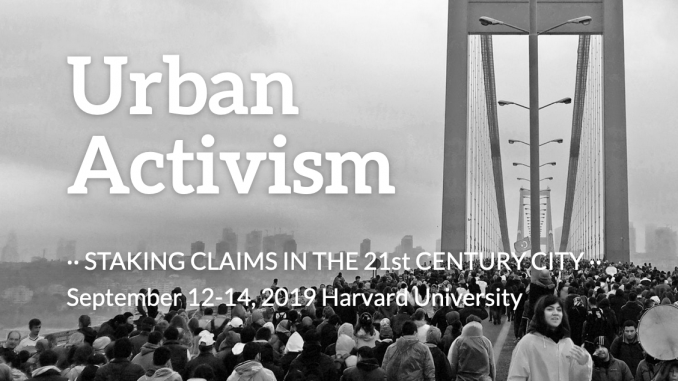
It is time to stop seeing the different roles we may play in social movements as a divide between activists and academics, and see it instead as an important and necessary division of labor. (Mitchell 2008, 454)
From September 12 to 14, 2019 an astonishing group of activists and scholars will meet in the emblematic space of Harvard University in the US. The aim of the meeting is to reflect on how universities can contribute to the struggles for housing, showing examples of real collaboration between scholars and activists, from social movements and from the academia, in different cities of the world.
Is it enough to write articles, publish books, present papers and organize conferences, to contribute to the aims of urban activism? How can we defend from institutional subsumption, from the cognitive industry that manages to convert any good idea in an occasion to create academic credit, scientific ranking, briefly, instruments to create profit even from political radicalism?
Universities are crucial actors in the gentrification of cities; Harvard is no exception, as the creation of its new Allston campus is expanding the impact from Cambridge, already whitened and turned into student residences, to the other cities of the Boston area (see this brilliant analysis of how Harvard impacts on Boston). Meanwhile, financial institutions work incessantly to deny gentrification and forced displacement, trying to erode the basis of urban struggles. The last example is this report of the Federal Reserve of Philadelphia, that tries to prove that commodification of cities benefits the poor, or at least that it does not do harm. The report, based on census and quantitative data, inspired a series of articles that push the arguments to say gentrification is positive: in the Financial Times, City Journal, in Spanish in El Confidencial (which also published a reply). These tesis keep receiving credit from the press, despite decades of scientific research on the violence of neoliberal urbanism.
Thus, it is surely crucial to keep producing critical reflection. But what is our aim? To publish in the Financial Times, to score many likes and retweets, that universities become richer and prestigious, to keep speculating and gentrifying the neighborhoods – or that our reflections and informations help urban struggles? What tools can we use to
Así que, sin duda, hace muchísima falta seguir produciendo reflexiones críticas. Pero ¿cuál es nuestro objetivo: que nos publiquen en el Financial Times, que nos hagan muchos retweet, que las universidades se hagan más ricas o prestigiosas, para seguir especulando y gentrificando – o que las reflexiones e informaciones que producimos sean útiles para las luchas urbanas? ¿Qué métodos podemos emplear para pasar el conocimiento desde las universidades hacia la sociedad civil, y no al revés?
 To address such complex and timely issues, we called together many people who fought and studied in different cities of the world. The result is the conference Urban Activism: Staking Claims in the 21st Century City. The participants:
To address such complex and timely issues, we called together many people who fought and studied in different cities of the world. The result is the conference Urban Activism: Staking Claims in the 21st Century City. The participants:
S’bu Zikode, leader of the slum-dwellers movement Abahlali baseMjondolo in Johannesburg; Welita Caetano of the Frente de Luta por Moradía in São Paulo, now included in the list of housing activists persecuted by Brazil’s government (see here); Erin McElroy of San Francisco’s Anti-Eviction Mapping Project; Diana Bell Sancho from DRAN, the MIT Displacement Research and Action Network; Yasar Adanali, an activist against evictions in Istanbul (see aquí) now a member of the Center for Spatial Justice; Steve Meacham and Lisa Owens from City Life Vida Urbana, a network against displacement in Boston; Dominic Moulden from Washington DC Organizing Neighborhood Equity (ONE-DC); Stavros Stavrides from Athens, a reknown theorist of the commons; Alexander Shopov working on community gardens in Istanbul; Abir Saksouk (via skype), an expert of popular participation in Beirut.
The conference is organized by Joan Chaker, Aylin Yildirim Tschoepe and Stefano Portelli, and will involve reknown social scientists, who will respond to the papers, and moderate the round table, or pronounce the keynote speeches. Among them: Mindy Fullilove, a New Jersey psychologist who since decades studies the displacement of Afro-American communities from US city centers (see here); Loretta Lees, critical geographer from Leicester, internationally known expert on gentrification in London and the world (see aquí); Michael Herzfeld, one of the most important living anthropologists, professor at Harvard, and who analyzes the relation between heritigization and ‘spatial cleansing’ in Rome and Bangkok; and Sai Balakrishnan, planner at Harvard’s GSD expert on the right to land in India. Here is the complete list of participants.
The last day of the conference, the Boston activists will bring the other participants in a guided tour in the contested spaces of Cambridge and Boston.
- Urban Activism: Staking Claims in the 21st Century City conference webpage. From September 12 to 14th,2019, in Harvard University’s Barker Center, 12 Quincy Street, Cambridge, MA. Very soon the conference booklet will be available in PDF!
- Gentrification negationism, i.e. the “cottage industry” of articles that cite Hamnett, Vigdor, Braconi and Freeman, keep trying to claim, against any evidence, that gentrification does not produce displacement (see this 2015 article in Slate, or this first Federal Reserve of Philadelphia report, which say the same things than the most recents ones, is a part of what Tom Slater calls agnatology: the intentional and active production of ignorance by neoliberal think tanks. An antidote: Tom SLATER, 2009, “Missing Marcuse: on Gentrification and Displacement“, City,13(2), 293-311.
- On the role of university in gentrification, see here (Londres), here (Chicago), here (New York) and here (Philadelphia)
- On militant research, : Don MITCHELL, 2008, “Confessions of a Desk-Bound Radical”, Antipode (PDF); BOOKCHIN, et al.. 2013. Militant Research Handbook. New York: New York University (PDF); Tania HERRERA 2018, “Militant Research“, Krisis, n.2.